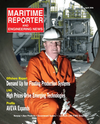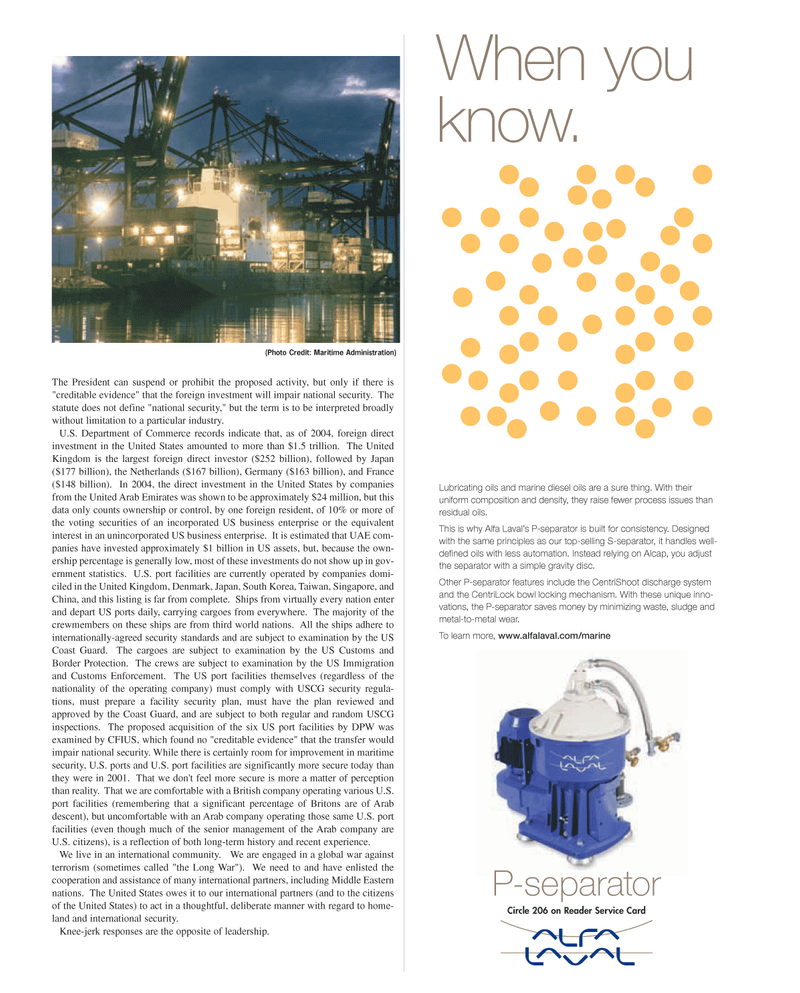
Page 23: of Maritime Reporter Magazine (April 2006)
The Offshore Industry Annual
Read this page in Pdf, Flash or Html5 edition of April 2006 Maritime Reporter Magazine
The President can suspend or prohibit the proposed activity, but only if there is "creditable evidence" that the foreign investment will impair national security. The statute does not define "national security," but the term is to be interpreted broadly without limitation to a particular industry.
U.S. Department of Commerce records indicate that, as of 2004, foreign direct investment in the United States amounted to more than $1.5 trillion. The United
Kingdom is the largest foreign direct investor ($252 billion), followed by Japan ($177 billion), the Netherlands ($167 billion), Germany ($163 billion), and France ($148 billion). In 2004, the direct investment in the United States by companies from the United Arab Emirates was shown to be approximately $24 million, but this data only counts ownership or control, by one foreign resident, of 10% or more of the voting securities of an incorporated US business enterprise or the equivalent interest in an unincorporated US business enterprise. It is estimated that UAE com- panies have invested approximately $1 billion in US assets, but, because the own- ership percentage is generally low, most of these investments do not show up in gov- ernment statistics. U.S. port facilities are currently operated by companies domi- ciled in the United Kingdom, Denmark, Japan, South Korea, Taiwan, Singapore, and
China, and this listing is far from complete. Ships from virtually every nation enter and depart US ports daily, carrying cargoes from everywhere. The majority of the crewmembers on these ships are from third world nations. All the ships adhere to internationally-agreed security standards and are subject to examination by the US
Coast Guard. The cargoes are subject to examination by the US Customs and
Border Protection. The crews are subject to examination by the US Immigration and Customs Enforcement. The US port facilities themselves (regardless of the nationality of the operating company) must comply with USCG security regula- tions, must prepare a facility security plan, must have the plan reviewed and approved by the Coast Guard, and are subject to both regular and random USCG inspections. The proposed acquisition of the six US port facilities by DPW was examined by CFIUS, which found no "creditable evidence" that the transfer would impair national security. While there is certainly room for improvement in maritime security, U.S. ports and U.S. port facilities are significantly more secure today than they were in 2001. That we don't feel more secure is more a matter of perception than reality. That we are comfortable with a British company operating various U.S. port facilities (remembering that a significant percentage of Britons are of Arab descent), but uncomfortable with an Arab company operating those same U.S. port facilities (even though much of the senior management of the Arab company are
U.S. citizens), is a reflection of both long-term history and recent experience.
We live in an international community. We are engaged in a global war against terrorism (sometimes called "the Long War"). We need to and have enlisted the cooperation and assistance of many international partners, including Middle Eastern nations. The United States owes it to our international partners (and to the citizens of the United States) to act in a thoughtful, deliberate manner with regard to home- land and international security.
Knee-jerk responses are the opposite of leadership.
When you know.
Lubricating oils and marine diesel oils are a sure thing. With their uniform composition and density, they raise fewer process issues than residual oils.
This is why Alfa Laval’s P-separator is built for consistency. Designed with the same principles as our top-selling S-separator, it handles well- defi ned oils with less automation. Instead relying on Alcap, you adjust the separator with a simple gravity disc.
Other P-separator features include the CentriShoot discharge system and the CentriLock bowl locking mechanism. With these unique inno- vations, the P-separator saves money by minimizing waste, sludge and metal-to-metal wear.
To learn more, www.alfalaval.com/marine
P-separator
Circle 206 on Reader Service Card (Photo Credit: Maritime Administration)
MR APRIL2006 #3 (17-24).qxd 4/3/2006 11:15 AM Page 23

 22
22

 24
24
